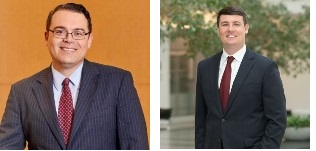- SixCap Healthcare Finance Launches Integrated Healthcare Capital Platform Combining Asset-Based Lending and Real Estate
- The Power of Mentorship: A Conversation with Frank Grimaldi
- Interview With SFNet’s Supply Chain Finance Convergence '26 Keynote, Financial Times' Robert Smith
- Appointing Independent Directors to Distressed Companies: An Alternative to Bankruptcy
- Gordon Brothers Bolsters Investment Committee with Janet Jarrett Appointment
FTC Ban on Noncompete Agreements: What Do Employers Need to Know?
May 7, 2024
By Jared Miller and Drew Stevens

Pictured: Jared Miller and Drew Stevens
INSIGHTS
- FTC voted 3-2 to finalize and issue a rule to ban virtually all noncompete clauses in employment contracts with extremely narrow exceptions.
- While the rule broadly prohibits noncompete clauses, it includes exceptions for certain franchise agreements, “sale-of-business” agreements, and certain other agreements.
- Despite the FTC’s ruling, legal challenges are mounting and have already been filed against the implementation of the rule.
- Employers are advised to closely monitor these legal challenges and ensure that they are appropriately using other employment protections such as nonsolicitation and nondisclosure provisions.
On April 23, 2024, the Federal Trade Commission (“FTC”) voted 3-2 to finalize and issue a rule banning virtually all noncompete clauses in employment contracts with extremely limited exceptions. The rule is set to go into effect 120 days after its publication in the Federal Register, which is pending. However, as explained below, it is uncertain whether this rule will go into effect due to the ongoing legal challenges surrounding the rule.
The rule does not apply to noncompetes contained within franchise agreements between franchisees and their franchisors, or noncompetes entered into in connection with certain “sale-of-business” agreements. The rule also has a narrow exception that allows already existing noncompetes with “senior executives” to remain in effect. A “senior executive” is defined as an employee earning more than $151,164 and who is in a “policy-making position,” such as a president, CEO, or other officers with “policy-making authority” for a business entity.
It is worth also noting that, in the final rule, the FTC expressly acknowledged that its noncompete ban would apply only to those entities covered by the FTC Act (which covers virtually every area of commerce with the limited exceptions of banks, non-profits, and common carriers, among a few others). So, for example, because banks, savings and loan institutions, and credit unions are regulated pursuant to the Federal Deposit Insurance Act (and are excluded from the FTC’s jurisdiction), the noncompete ban on its face does not apply to these entities, among others outside the scope of the FTC Act.
For financial institutions, however (and as also recognized by the FTC), it is possible that federal banking regulators may attempt to enforce similar bans as to the entities within their own jurisdiction. Moreover, the FTC also expressly rejected a complete exclusion of bank holding companies or subsidiaries of otherwise excluded financial institutions to the extent the bank holding companies or the subsidiaries themselves fall within the FTC’s jurisdiction. As a result, the parent company and affiliates of an otherwise excluded bank or other financial institution may be subject to the noncompete ban.
In the same way, the FTC explicitly declined to recognize non-profit entities registered under 501(c)(3) of the Internal Revenue Code as categorically outside the noncompete ban (including healthcare organizations with 501(c)(3) status). Instead, drawing on court cases and its own precedent, the FTC stated that a non-profit entity must satisfy an established two-part test to be outside the scope of the noncompete ban: 1) the entity must have “an adequate nexus” between its activities and its stated public purpose; and 2) the entity’s net proceeds must be “properly devoted” to recognized public interests. So, if a non-profit entity cannot satisfy this test, then the FTC would consider that entity to be bound by its noncompete ban.
As anticipated, the rule is already facing several legal challenges aimed at preventing its implementation. These challenges seek a federal court declaration asserting that the FTC lacks the authority to issue the rule and that it is unconstitutional. As a result, it is uncertain whether the rule will ever go into effect.
Employers should therefore monitor these legal challenges, while also investing time to ensure the effectiveness of their existing nonsolicitation and nondisclosure provisions and trade secrets protections. Employers should also consider making greater use of “garden leave,” in which an employee remains on a company’s payroll but is instructed to stay away from work during a period of time following their resignation or termination.
Please note that the information provided in this release is general in nature and not intended as legal advice. Specific circumstances may vary, and we encourage clients to contact us directly for personalized assistance and further information.
Parker Hudson’s Client Alerts are published solely for the interests of friends and clients of Parker, Hudson, Rainer & Dobbs LLP and should in no way be relied upon or construed as legal advice. For specific information on recent developments or particular factual situations, the opinion of legal counsel should be sought.
About the Author
© 2026 Secured Finance Network


.jpg?sfvrsn=f1093d2a_0)
